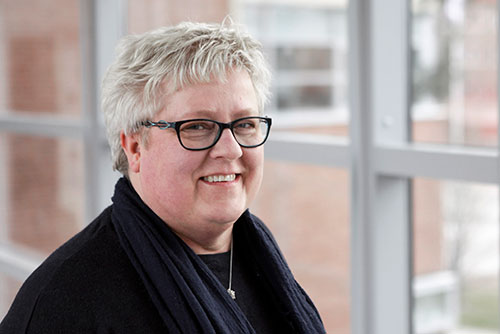A model of communication contributes to patient safety in elderly care

Anette Johnsson
A new dissertation from the University West, in collaboration with Jönköping University, highlights how positive healthcare relations are created and established in the meeting between nurse, patient and relatives. The dissertation is based on a medical elderly care unit and clearly shows the nurse's role in creating conditions for a good relationship and joint responsibility.
With an increased proportion of elderly in society, today higher number of elderly people with multimorbidity are being placed in hospital wards where relatives play an important role in various ways. Meetings that take place within the healthcare system often determine whether the patient and relatives are satisfied with the provided care. Deficiencies in communication and social interaction may lead to misunderstandings and cause a deterioration in the patient’s health process.
The thesis “Creating and establishing a positive care relationship between nurses, patients and relatives. - An ethnographic study of encounters at a department of medicine for older people”, describes a process where nurses, patients and relatives use different strategies in establishing a healthcare relation.
"The process shows that those involved in a care meeting prepare in different ways. They contribute during the meeting and after the meeting they look at the healthcare relation from a different angle.In my dissertation, I highlight the important role of the nurse in starting, leading and concluding the meeting in a way that creates the conditions to establish a positive healthcare relation. Through a constructive knowledge exchange, joint responsibility and participation you enhance the understanding of the patient, which also contributes to maintaining patient safety," says Anette Johnsson.
Anette Johnsson believes that if the nurse has an awareness of factors such as routines and norms, the nurse will add a positive climate to the healthcare relation. A model based on among other; the adaptation of voice and body language rooted in medical knowledge, the nursing role, pedagogical task and position of power, enables the nurse to facilitate both the patient and relatives to become more active in the dialogue. This creates a good foundation for mutual understanding, the patient's health process and the various perspectives of those involved.
"My hope is that the results of the dissertation will be useful for professional nurses, but also of interest for patients and their relatives," says Anette Johnsson.On May 29, 2020, Anette Johnsson successfully defended her dissertation.
Anette has a background as a nurse, midwife and lecturer at the Nursing programme at University West, Trollhättan. The PhD studies have been carried out in collaboration with the Doctoral programme at School of Health and Welfare, Jönköping University. The purpose of the dissertation is to explore and describe the healthcare relation, communication, content and social interaction in the triad meeting between nurses, patients and relatives. The data production was carried out through participating observations with subsequent informal, individual conversations and field notes.
